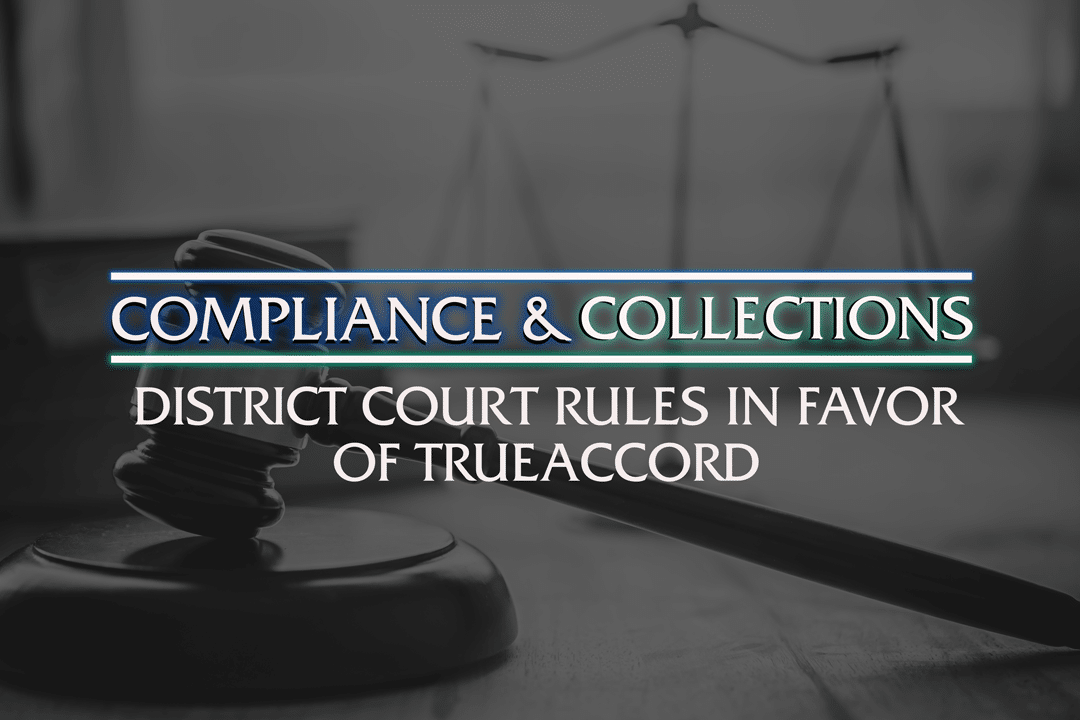
A reply email with notice of attorney representation applies only to the individual account
A new District Court opinion weighs in on digital debt collection efforts, making clear that a notice of attorney representation provided in reply to an email about an account only applies to that specific account. In Tamika Gilbert v. TrueAccord Corp., Case No.: 1:21-cv-00486, the United States District Court for the Eastern District of Illinois, dismissed the case in favor of TrueAccord. This is another in a small line of cases relating to digital collection of debt. See, for example, the case of Greene v. TrueAccord, in which the court upheld TrueAccord’s use of email for the initial notification, also codified in Regulation F.
The Case
Ms. Gilbert sued TrueAccord alleging (1) TrueAccord made a false or misleading statement when it failed to inform her that an account was past the statute of limitations and (2) TrueAccord had contacted her after being informed that she was represented by counsel. After conducting discovery, both Gilbert and TrueAccord filed motions seeking summary judgment – a decision by the court without the need for trial that will be granted only if there are undisputed facts that permit a judgment under the law.
The parties agreed that:
- TrueAccord emailed Gilbert on January 10, 2021 regarding Creditor A’s account;
- TrueAccord emailed Gilbert by email on January 19, 2021 regarding Creditor B’s Account;
- Gilbert’s attorney forwarded to TrueAccord a copy of the collection email regarding Creditor B’s account, stating, “I am representing this consumer. Do not contact her again.”
- TrueAccord emailed Gilbert on January 24, 2021 regarding Creditor A’s account.
The Ruling
The court ruled in TrueAccord’s favor on two grounds.
First, the court found that Gilbert did experience harm when she said that the emails caused her to “shake with rage.” The Court ruled that these allegations of physical manifestations of harm were sufficient harm to confer standing to bring the lawsuit. While annoyance, stress, or anger are not sufficient harms without more, an alleged physical reaction to the emotion is sufficient harm for Gilbert to have standing to pursue the second claim.
On the merits of the communication-after-notice of attorney representation claim, the Court ruled in favor of TrueAccord and dismissed the claim. The Court found that Section 1692c(a) of the Fair Debt Collection Practices Act prohibits a collector from communicating with a consumer whom it knows to be represented by counsel with respect to such debt. The Court noted that the communication by Gilbert’s attorney was regarding the specific Creditor B account. Absent an express intent to represent a consumer regarding all accounts or a list of specific accounts, TrueAccord’s knowledge was limited to her representation with regard to the Creditor B account only. As the subsequent communication was regarding another account owed to a different creditor where TrueAccord had no knowledge of attorney representation, no violation occurred. TrueAccord did not send any further communications with respect to Creditor B’s account on which TrueAccord knew Gilbert to have counsel.
Second, with respect to the claim that Gilbert was confused by the notice stating that the account had passed the statute of limitations for the purpose of filing a lawsuit (a requirement of law), the court found that Gilbert had not alleged sufficient harm to have standing to bring the first claim. The court noted that Gilbert’s damages were the time lost allegedly contacting an attorney regarding the Out Of Statute (OOS) language. While lost time can be an injury that supports a claim, here the time allegedly lost was time was solely time spent consulting an attorney as doing so would permit anyone to create standing by retaining counsel.
Key Takeaways
This case is important because it reaffirms that attorney representation must be clear to be account specific, not consumer specific. It also adds another in a line of cases finding that a plaintiff must have sufficient harm to have the standing to bring a claim in federal court.
These key takeaways from the ruling help further clarify the parameters of digital debt collection communication for both creditors, collectors, and consumers. This wasn’t just a win for TrueAccord, but for the industry as well.
Want to learn more about the different facets of compliance in collections? Join us Thursday September 29th at 1pm ET for our interactive webinar, The Future of Collections & Compliance, hosted by TrueAccord Associate General Counsel Lauren Valenzuela and Director User Experience Shannon Brown.
Reserve your space now for an interactive discussion on:
- Cutting edge digital collection compliance
- The role of the legal team in creating a digital collection strategy
- How cutting edge compliance drives collection revenue
- The future of digital compliance
Register now for the upcoming webinar»»

*Steve Zahn serves as TrueAccord’s Associate General Counsel. This blog is not legal advice. Legal advice must be tailored to the particular facts and circumstances of each unique matter.